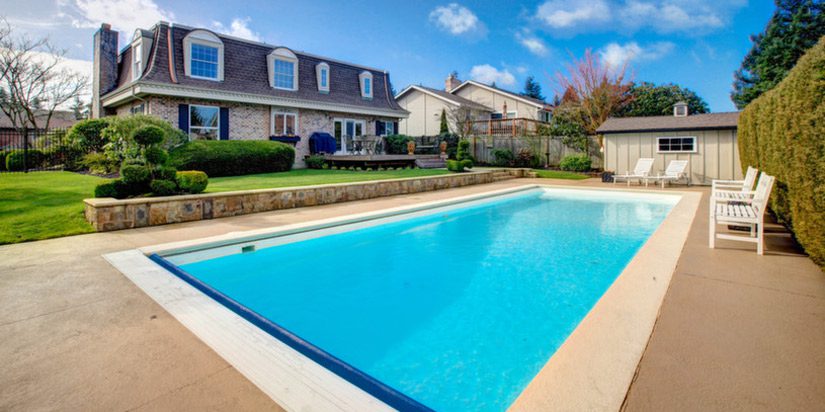What was once called the “world wide web” is now a search engine on a smart phone. This is how we shop and how we get answers to just about anything. Alexa and Siri are always on standby. Or we can type into a little, white box to get millions of results in under a second.
It’s easy to conduct research today, and research we do as we’re a generation concerned about everything from eating organic foods to getting the best deals on airline tickets. We want to be informed consumers.
If you are looking to install a backyard pool, enter the term “chlorine swimming pools.” The return is over 33 million results. The information age offers zillions of benefits, but nonetheless can be overwhelming when trying to decide on saltwater vs. chlorine swimming pools.
Saltwater vs. Chlorine Swimming Pools
Besides the pool financing part, there are many decisions that go into constructing the backyard swimming pool of your dreams. What kind of shape? What kind of tile? What’s the color scheme? What does the access look like – ladders or steps? Do we install the outdoor kitchen now or wait until next year? Do we want/need a cabana? It’s an exciting list of questions to pose.
Perhaps one of the most important decisions speaks to the very nature of the pool. We are a country becoming more health conscious or at least more aware. Chlorine pools have long been the standard to keep pools clean and free of algae and contaminants. However, the common complaints about chlorine include:
- It is an irritant to eyes and skin
- It can be hazardous to handle and store
- Its odor can be overwhelming
- You need to be careful you don’t add too much or too little
Chlorine Pool Alternatives
Contrary to popular belief, saltwater pool systems are not at the complete opposite end of the pool spectrum. These are not pools that feel/smell like the ocean, nor will you enjoy the same “beachy” concentration of salt as though you were swimming in the Atlantic.
There are pros and cons to consider for both pool types.
First of all, “salt water pool” is a bit of a misnomer. They are not chlorine-free. They use a process called “electrolysis” to create their own chlorine using salt. Effectively, this system is designed to produce chlorine, so it need not be added manually.
What are the Saltwater Pool Advantages?
In contrast to the common complaints about chlorination, these pools have a softer side:
- By using a salt generator, the chlorine levels are lower, so the irritation levels are lessened.
- The water will feel nicer or softer because it is treated. In some areas of the country like Florida where residential water is considered “hard” due to high mineral concentrations of calcium and magnesium, homes and businesses use water softeners to reduce the hardness of water by neutralizing the minerals through an ion exchange process. The concept here is a bit similar, thereby leaving the pool water feeling less coarse or abrasive.
- Because a generator is doing the heavy lifting, you needn’t deal directly with the chemicals and the maintenance. You do however, still need to monitor pool water chemical & pH levels and make sure the automated system is functioning as it should, expelling the proper amounts of product for the health of the pool and its inhabitants.
What are Saltwater Pool Disadvantages?
Cost. Just as the price is premium on organic produce and cookies that are fat-free, your “chlorine-free” pool carries a heftier price tag. On the other side, if you crunch your numbers effectively, you may find that the cost disparity can be recovered over time as you will save on other costs like chemicals. That could be a big “if” as costs may be hard to project. You are better off considering that this expenditure is a more expensive one to best set your expectations.
Wear and Tear. Considering there have been tremendous strides in pool technology like smart pool devices, voice activated controls, and advances in pool automation, you may find newer equipment better equipped to manage a saltwater system. However, if you consider how saltwater rusts BBQs and other metals in homes by a saltwater shore, you may find impact on a pool’s mechanics, fixtures, and even underwater lighting. Proper pool maintenance and adherence to safety is essential.
Technology. There could be a higher likelihood you’ll need to place a service call when something goes wrong due to the system’s complexity. When anything in your home is more automated, the possibility of a DIY fix decreases proportionally. Think back when cars started having computer systems requiring diagnostics run by software. These were issues beyond faulty nuts/bolts and spark plugs that could be replaced. You should add a service contract to your budget to protect your investment.
Other Pool Alternatives
UV pool systems. These are designed to create an eco-friendlier environment in your backyard pool. Reputed to drastically reduce the need for chemicals, they use an ultraviolet system that neutralizes microorganisms resistant to chlorine or salt generator sanitizers.
The Bottom Line
As with any decision you make for your family, take into consideration your specific individual needs, your finances, and how committed you are to manage an addition to your home.
Pool technology has made the same advances as those that drive other industries. You can get the help you need to keep the pool you choose both healthy for your family and in excellent working condition. The concept of a saltwater pool is certainly alluring given the reduced amount of chemicals needed and the fact that their addition is automated. These two factors alone may be enough to offset the initial costs of its installation.
We love the difference we can make for your family by providing something that puts years of memories within reach. Call 877-754-5966 for more information about our pool and backyard living financing options.




